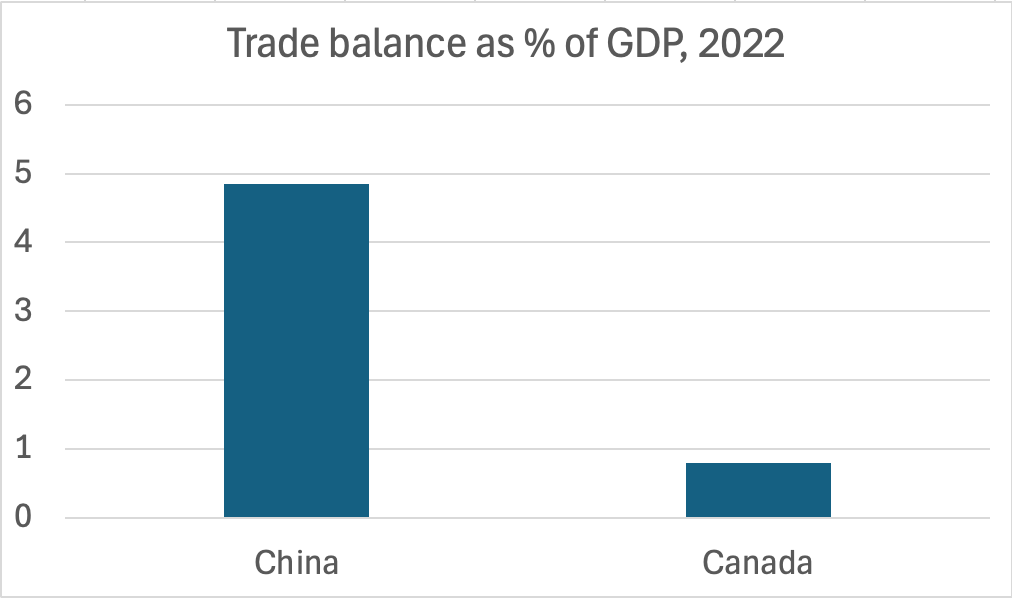Why Has Trump Gone Soft on China and Hard on Canada?
National interest? Or personal interest?
The tariffs Donald Trump imposed during his first term were mainly aimed at China. There were a few exceptions, like a tariff on Canadian aluminum, supposedly to protect national security (which was crazy.) But China was, rhetorically and practically, the big trade enemy.
And Trump’s talk about trade during the campaign seemed to point to a continuation of this pattern, with pledges of a 10 percent tariff across the board but 60 percent on China.
But now we have the first big tariff announcement from Trump 2.0, and it’s 25 percent tariffs on Mexico and Canada but only 10 percent on China.
True, those original China tariffs of around 19 percent are still in place. But this still means that Canada is now facing tariffs comparable to those imposed on China. And you should also bear in mind that Canada is far more dependent on exports to the United States than China is:
Source: World Trade Organization
So basically this is a slap on the wrist for an autocratic regime that is a dangerous rival and even potentially a military foe, versus a body blow to a democracy that is arguably our best ally.
Wait, it gets worse. China runs a large overall trade surplus, which isn’t always a bad thing but in this case does reflect China’s attempt to export its way out of the failure of its domestic policies. Canada runs roughly balanced trade:
Source: World Trade Organization
It’s true that Canada runs a bilateral trade surplus with the United States, selling more to us than it buys. (Trump, however, routinely overstates the size of this surplus by a factor of two or three, and calls it a “subsidy,” which makes no sense at all.) But this surplus is entirely caused by Canadian energy exports, mainly oil to the U.S. upper Midwest:
How is that a bad thing?
Bottom line: I can’t think of a reason punishing Canada with tariffs, let alone treating our neighbor far more harshly than Trump is treating China, is in the national interest. Trump’s spokesperson says that it’s because of the fentanyl pouring across our northern border, which wouldn’t justify tariffs even if it were happening — which it isn’t.
But who says that these tariffs have anything to do with the national interest — as opposed to the personal interests of the people calling the shots?
My guess is that Trump is imposing steep tariffs on Canada and Mexico just to show that he can — that it’s essentially a dominance display. And the many people pointing out that it’s a terrible idea probably only reinforced his determination to show that he’s in charge and smarter than anyone else.
What about letting China off easy? We know that Elon Musk has strong business reasons for wanting to treat China gently. Back in November Politico Europe wrote:
The reelection of Donald Trump is threatening to tip U.S.-China relations into a downward spiral of trade tariffs and escalating international spats, with Europe stuck in the middle.
But China thinks it has an ace in its back pocket that could help keep Trump’s more robust policies in check: Tesla CEO Elon Musk, whose company depends on good ties with the Asian country.
It sure looks as if the Chinese judged that correctly, doesn’t it?
And then there’s the matter of Trump’s self-dealing, especially through the $Trump and $Melania tokens, which clearly have no intrinsic value. Who bought these tokens? Were they grifts aimed at red-hatted MAGA fans who don’t know better?
Well, a significant number of small investors did buy them. But Chainalysis found that 94 percent of the tokens were purchased by around 40 “whales,” large buyers holding more than $10 million worth of the coins.
We don’t know who these whales are. But it’s not unreasonable to guess that they were individuals or entities seeking to buy influence, rather than looking for a good investment.
Could some of the whales be effective proxies for the Chinese government? Could China have, in effect, bought itself lower tariffs by enriching Trump personally? To be clear, I have no evidence that this happened. But in making this conjecture, isn’t this a plausible explanation?
And let me make a broader point: If a nation’s leaders are personally corrupt, autocracies like China will have an advantage over democracies where rule of law prevails. To wit, Canada can’t buy itself favorable trade treatment by bribing foreign heads of state. To do so would be a huge scandal and provoke parliamentary inquiries. But China certainly can. Although once again, we don’t know whether it did.
Anyway, the fact remains: Trump is imposing destructive (and self-destructive) tariffs on an ally that has done nothing wrong, while handling a rival and potential enemy with kid gloves. It is hard to believe that sheer stupidity — although there’s plenty of that going on — can explain it.
MUSICAL CODA







I can tell you this is irreparably poisoning the Americana well in Canada. Some will have trouble conflating their ill will towards the Trump regime with American citizens.
If Putin were able to place a paid agent in the WH, would he do anything differently from what DJT is doing to destroy American credibility and economic power?